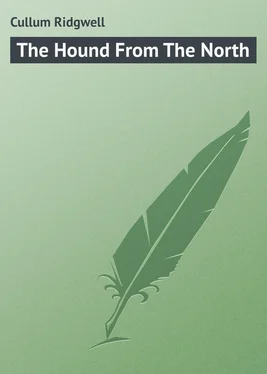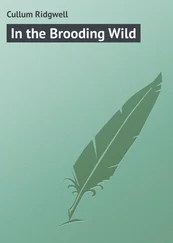Ridgwell Cullum - The Hound From The North
Здесь есть возможность читать онлайн «Ridgwell Cullum - The Hound From The North» — ознакомительный отрывок электронной книги совершенно бесплатно, а после прочтения отрывка купить полную версию. В некоторых случаях можно слушать аудио, скачать через торрент в формате fb2 и присутствует краткое содержание. Жанр: foreign_prose, на английском языке. Описание произведения, (предисловие) а так же отзывы посетителей доступны на портале библиотеки ЛибКат.
- Название:The Hound From The North
- Автор:
- Жанр:
- Год:неизвестен
- ISBN:нет данных
- Рейтинг книги:3 / 5. Голосов: 1
-
Избранное:Добавить в избранное
- Отзывы:
-
Ваша оценка:
- 60
- 1
- 2
- 3
- 4
- 5
The Hound From The North: краткое содержание, описание и аннотация
Предлагаем к чтению аннотацию, описание, краткое содержание или предисловие (зависит от того, что написал сам автор книги «The Hound From The North»). Если вы не нашли необходимую информацию о книге — напишите в комментариях, мы постараемся отыскать её.
The Hound From The North — читать онлайн ознакомительный отрывок
Ниже представлен текст книги, разбитый по страницам. Система сохранения места последней прочитанной страницы, позволяет с удобством читать онлайн бесплатно книгу «The Hound From The North», без необходимости каждый раз заново искать на чём Вы остановились. Поставьте закладку, и сможете в любой момент перейти на страницу, на которой закончили чтение.
Интервал:
Закладка:
The winter evening shadows–it was the middle of January and winter still held sway upon the prairie–were falling, and the parlour at the farm was enveloped in a grey dusk. The room was large, low-ceiled, and of irregular shape.
It was furnished to serve many purposes, principally with a view to solid comfort. There was no blatant display of wealth, and every article of furniture bore signs of long though careful use. The spotless boarded floor was bare of carpet, but was strewn with rough-cured skins, timber-wolf, antelope, coyote and bear, and here and there rugs of undoubted home make; these latter of the patchwork order. The centre table was of wide proportions and of solid mahogany, and told of the many services of the apartment; the small chairs were old-fashioned mahogany pieces with horse-hair seats, while the easy-chairs–and there were several of these–were capacious and of divers descriptions. A well-worn sofa was stowed away in an obscure angle, and a piano with a rose-silk front and fretwork occupied another of the many dark corners which the room possessed.
The whole atmosphere of the place was of extreme comfort. The bare description of furniture conveys nothing, but the comfort was there and showed out in the odds and ends of family possessions which were in evidence everywhere–the grandfather’s clock, the sewing-machine, the quaint old oil-lamps upon the mantel-board over the place where the fire should have been but was not; the soft hangings and curious old family pictures and discoloured engravings; the perfect femininity of the room. In all respects it was a Canadian farm “best parlour.”
There were four occupants of the room. Two old ladies, rotund, and garbed in modest raiment of some sort of dark, clinging material, were gathered about the monster self-feeding stove, seated in arm-chairs in keeping with their ample proportions. One was the widow of the late Silas Malling, and the other was the school-ma’am from the Leonville school-house. This good lady rejoiced in the name of Gurridge, and Mrs. Gurridge was the oldest friend of Hephzibah Malling, a fact which spoke highly for the former good dame’s many excellent qualities. Hephzibah was not a woman to set her affections on her sex without good reason. Her moral standard was high, and though she was ever ready to show kindliness to her fellow-creatures, she was far too practical and honest herself to take to her motherly bosom any one who was not worthy of regard.
As was natural, they were talking of the forthcoming marriage, and the tone of their lowered voices indicated that their remarks were in the nature of confidences. Mrs. Malling was sitting bolt upright, and her plump, rather rough hands were folded in her broad lap. Mrs. Gurridge was leaning towards the stove, gazing into the fire through the mica sides of the fire-box.
“I trust they will be happy,” said Mrs. Gurridge, with a sigh. Then as an afterthought: “He seems all right.”
“Yes,” Mrs. Malling said, with a responsive exhalation, “I think so. He has few faults. But he is not the man to follow my Silas on this farm. I truly believe, Sarah, that he couldn’t tell the difference between a cabbage-field and a potato-patch. These what-d’you-call-’ems, Civil servants, are only fit to tot up figures and play around with a woman’s wardrobe every time she crosses the border. Thank goodness I’m not of the travelling kind; I’m sure I should hide my face for very shame every time I saw a Customs officer.”
The round, rosy face of the farm-wife assumed a deeper hue, and her still comely lips were pursed into an indignant moue . Her smooth grey head, adorned by a black lace cap trimmed with pearl beads, was turned in the direction of the two other occupants of the room, who were more or less buried in the obscurity of a distant corner.
For a moment she gazed at the dimly-outlined figure of a man who was seated on one of the horse-hair chairs, leaning towards the sofa on which reclined the form of her daughter, Prudence. His elbows were resting on his knees and his chin was supported upon his two clenched fists. He was talking earnestly. Mrs. Malling watched him for some moments, then her eyes drifted to the girl, the object of her solicitude.
Although the latter was in the shadow her features were, even at this distance, plainly discernible. There was a strong resemblance between mother and daughter. They were both of medium dark complexion, with strong colouring. Both were possessed of delightfully sweet brown eyes, and mouths and chins firm but shapely. The one remarkable difference between them was in the nasal organ. While the mother’s was short, well-rounded, and what one would call pretty though ordinary, the girl’s was prominent and aquiline with a decided bridge. This feature gave the younger woman a remarkable amount of character to her face. Altogether hers was a face which, wherever she went, would inevitably attract admiring attention. Just now she was evidently teasing the man before her, and the mother turned back to the stove with a merry twinkle in her eyes.
“I think Prudence will teach him a few lessons,” she murmured to her friend.
“What–about the farm?”
“Well, I wasn’t just thinking of the farm.”
The two ladies smiled into each other’s faces.
“She is a good child,” observed Mrs. Gurridge affectionately, after awhile.
“Or she wouldn’t be her father’s child.”
“Or your daughter, Hephzibah,” said Sarah Gurridge sincerely.
The two relapsed into silence. The glowing coals in the stove shook lower and received augmentation from the supply above. Darkness was drawing on.
Prudence was holding the Free Press out towards the dying light and the man was protesting. The latter is already known to us. His name was Leslie Grey, now an under-official of the Customs department at the border village of Ainsley.
“Don’t strain your eyes in this light, dear,” he was saying. “Besides, I want to talk to you.” He laid his hand upon the paper to take it from her. But the girl quickly withdrew it out of his reach.
“You must let me look at the personal column, Leslie,” she said teasingly, “I just love it. What do you call it? The ‘Agony’ column, isn’t it?”
“Yes,” the man answered, with some show of irritation. “But I want–”
“Of course you do,” the girl interrupted. “You want to talk to me–very right and proper. But listen to this.”
Grey bit his lip. Prudence bent her face close to the paper and read in a solemn whisper–
“‘Yellow booming–slump in Grey’! Now I wonder what that means? Do you think it’s a disguised love message to some forlorn damsel in the east, or does it conceal the heartrending cry of a lost soul to some fond but angry parent?” Then, as the man did not immediately answer, she went on with a pucker of thought upon her brow. “‘Yellow’–that might mean gold. ‘Booming’–ah, yes, the Kootenai mines, or the Yukon. There is going to be a rush there this year, isn’t there? Oh, I forgot,” with real contrition, “I mustn’t mention the Yukon, must I? That is where your disaster occurred that caused you to be banished to the one-horsed station of Ainsley.”
“Not forgetting the reduction of my salary to the princely sum of two thousand dollars per annum,” Grey added bitterly.
“Never mind, old boy, it brought us together, and dollars aren’t likely to trouble us any. But let me get on with my puzzle. ‘Slump in Grey.’ That’s funny, isn’t it? ‘Slump’ certainly has to do with business. I’ve seen ‘Slump’ in the finance columns of the Toronto Globe . And then ‘Grey.’ That’s your name.”
“I believe so.”
“Um. Guess I can’t make much of it. Seems to me it must be some business message. I call it real disappointing.”
Читать дальшеИнтервал:
Закладка:
Похожие книги на «The Hound From The North»
Представляем Вашему вниманию похожие книги на «The Hound From The North» списком для выбора. Мы отобрали схожую по названию и смыслу литературу в надежде предоставить читателям больше вариантов отыскать новые, интересные, ещё непрочитанные произведения.
Обсуждение, отзывы о книге «The Hound From The North» и просто собственные мнения читателей. Оставьте ваши комментарии, напишите, что Вы думаете о произведении, его смысле или главных героях. Укажите что конкретно понравилось, а что нет, и почему Вы так считаете.












